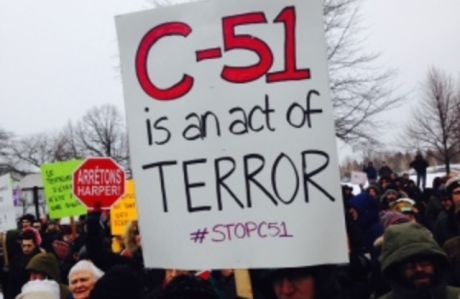News
You are here
Bill C-51 targets First Nations activists

March 30, 2015
In the confusion immediately following the shooting on Parliament Hill in October 2014, Globe and Mail reporter Bill Curry sent the following tweet: “Eyewitnesses say suspect has long dark hair and two said he appeared to be aboriginal.” Aside from the racist stereotyping perpetuated by both bystanders and reporter, this speaks to the level of official animosity, suspicion and fear directed to First Nations communities and activists. This will only be heightened by the anti-terrorism legislation (Bill C-51) now before parliament.
Pam Palmater, a Mi’kmaq activist, lawyer and professor at Toronto’s Ryerson University is unequivocal: "Any activity by anyone in Canada which relates to or poses a potential threat to things like the economy, critical infrastructure, diplomatic relations, territorial integrity and sovereignty of all things, can be on this terror list.” That means that those defending First Nations sovereignty are automatically criminalized for refusing to recognize the supremacy of the colonial state.
Criminalizing Indigenous dissent
Even without C-51, Palmater has been subjected to surveillance and harassment because of her support for Idle No More. “I wrote an access to information request to CSIS (the Canadian Security Intelligence Service), National Defence, the RCMP and Indian Affairs to determine whether or not they were following (or) surveilling me in any way and three out of the group all confirmed that they were,” she told CTV news. “They are already spying on me. So right now, without this anti-terrorism bill, my rights are already being violated.”
In her brilliant written submission to the Bill C-51 hearings, veteran Kanien’kehá:ka (Mohawk) activist and artist Ellen Gabriel points to the same, long history of police spying and surveillance dating to her involvement in the Oka Crisis in 1990. She argues that the colonialist Canadian government has always criminalized First Nations people who defend their rights and their lands.
She writes: “It has been mentioned by the government of Canada that this Bill is to protect its citizens from those who are a threat to ‘… the sovereignty, security or territorial integrity of Canada or the lives or the security of the people of Canada’ . However, as previously mentioned, the incessant criminalizing of Indigenous peoples who defend their lands from development perpetuates the historic injustices designed to undermine and devalue the hope for a peaceful co-existence for the sake of economic and energy security.”
Legal opinion supports these voices. Michael McClurg and Senwun Luk, attorneys with Olthuis, Kleer and Townshend law firm, have analyzed C-51 and conclude it gives the government a “blank cheque” to criminalize indigenous dissent. They identify the crux of the Bill, that sets it apart from existing laws: “The proposed law takes the existing power of the government to arrest someone without a warrant if law enforcement think a terrorist act ‘will be carried out’, and gives the police to arrest someone if they think a terrorist act ‘may be carried out’. The government’s defenders have tried to assuage critics by arguing that Canadians can trust the government not to abuse its broad new powers. Yet as Canada’s indigenous citizens know full well, this government has had few qualms about labelling its critics from indigenous communities as enemies of the government and of the country generally.”
They have that right. During the hearings into C-51, the government’s tactic was to launch ad hominem attacks on all critics–environmental groups, civil liberty organizations, Muslim groups and First Nations speakers–accusing them of sympathizing with terrorism.
Kill the Bill
The Harper Tories have announced that they will accept a number of amendments Bill C-51. In part, this is due to a massive wave of opposition, rallies and teach-ins all across the country. Popular support for the Bill has plummeted as people have seen how much unrestricted power it grants to domestic spy agencies.
But it also fits with tried and true Tory strategy. Time and again they have introduced sweeping legislation, faced popular outcry, granted a few cosmetic concessions, demobilized the opposition and got away with what they wanted.
We can’t let it happen again. No amendments can salvage C-51. Running through the very heart of the Bill is language defining terrorism so vaguely that the term can be applied to almost anyone who acts to oppose government policy.
In recent days we have witnessed a frightening level of police violence in Quebec, directed at peaceful protests against government austerity measures. It seems that even before it is passed, the tabling of Bill C-51 has emboldened the state and police, determined to stamp out popular opposition before it can grow.
Opposing Bill C-51 must continue, and we have to connect that fight to the ongoing opposition to austerity and war. Harper knows these things are tied together. We can do no less.
If you like this article, register for Rage Against the System, a weekend conference of ideas to change the world, April 24-26 in Toronto. Sessions include "Stopping Harper's agenda," "Colonialism and Indigenous resistance," and "Quebec against austerity"
Section:










